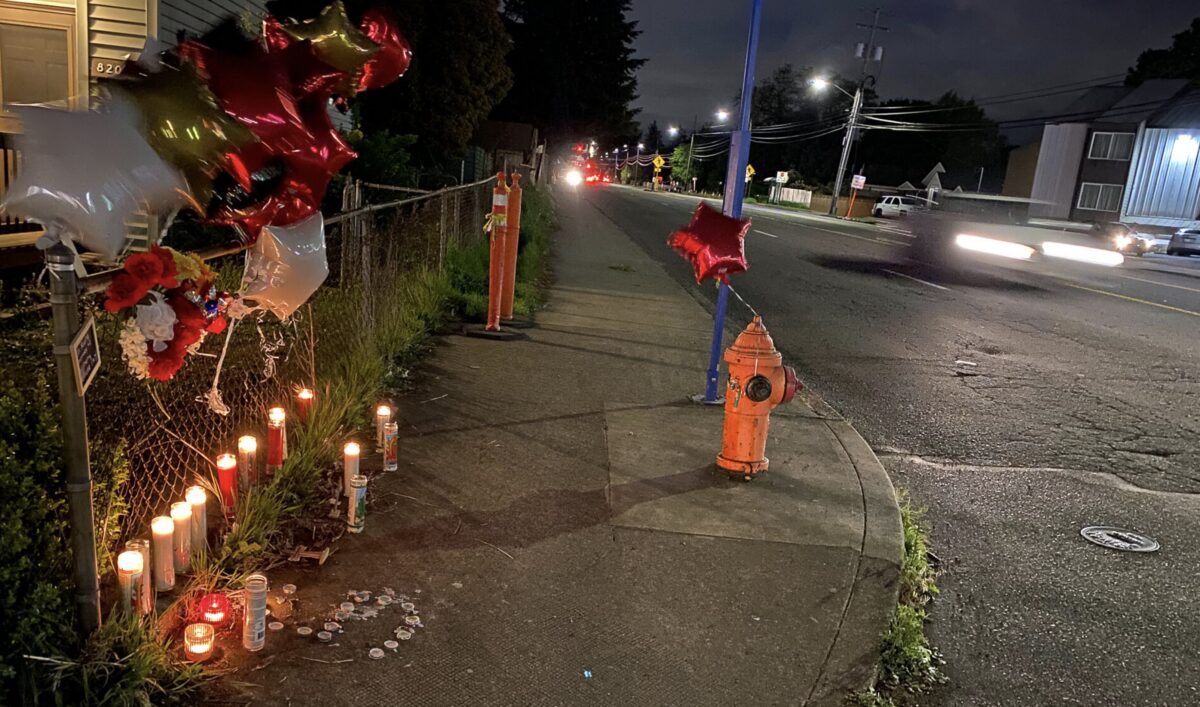 Traffic death memorial on 82nd Ave. (Photo: Jonathan Maus/BikePortland)
Traffic death memorial on 82nd Ave. (Photo: Jonathan Maus/BikePortland)
Once again we are at the end of a year and once again I’m faced with the intense anger and frustration at another spate of road deaths. Four people have died while using Portland roads in the last seven days. Just since this past Thursday, three people were killed after being hit by a driver while walking.
According a statement by the Portland Police Bureau, the number of pedestrians killed on our roads has reached a 70-year high. (For some reason our tracker shows a much lower number than the PPB. I’m still working to figure out why.) So far this year they say we’ve had 66 total deaths, just one less than last year which was a 35-year high. Their numbers put the current toll of people killed while walking at 31 — a number we haven’t reached since 1952.
In 2021, the Portland Bureau of Transportation said the death toll was “devastating.” In 2020, they said the toll was “unusual” and “new and unexpected.” Now it feels like we’ve reached a new normal. It’s no longer possible for PBOT to excuse this rise in deaths as a fluke. Our collective inability to meet the challenge and respond to this crisis in a way that’s commensurate with its underlying causes is damning. If we want to end this madness, we must care about this issue — and the people who are dying — enough to act differently.
The PPB seems to care. But do their actions and policy choices reflect that?
“Despite advances in technology, infrastructure, education and awareness,” the PPB said, “We are still not solving the problem. And our traffic fatalities are at epidemic levels.” I’m glad the PPB used the word epidemic. Language matters, and advocates and policymakers should hold them and other agencies accountable to respond accordingly.
But “advances”? Really? If we’d truly made advances on those fronts, I wouldn’t be writing this piece.
Let’s take each “advance” the PPB says we’ve made.
Technology: I’m really curious what technology they’re referring to here. With obscenely large screens and so much illegal phone use, cars have more high-tech distractions in them than ever. That’s not an advance, that’s a red flag. Almost every piece of car technology benefits only drivers and their occupants. Is the PPB referring to smarter traffic signals perhaps? Those are no match for selfish, scofflaw drivers who ignore anything that gets in their way. Maybe police have better technology to track down speeders? That only matters when they actually use it. Take automated traffic cameras: Despite finally passing a law early this year (after PPB fought against it) that lets civilians take the place of police officers in the processing of citations, PBOT has not installed a single automated enforcement camera since fall 2021. Cameras are perhaps the single most effective piece of technology we have to battle unsafe roads and PBOT has so far failed to deliver on it. Since launching the program in 2016, there are only five intersections citywide that are monitored with speed cameras.
Infrastructure: Yes we are busy with road projects, but work itself isn’t progress. Time and time again we’ve made decisions on road designs based on what makes politics safe, not what makes people safe. Our infrastructure is still way too imbalanced because PBOT and ODOT and too many Portlanders are reluctant to change the status quo. Why? Because they are afraid to make it less convenient to drive everywhere all the time. Similar to how some Portlanders say they care about affordable housing but fight new apartments in their neighborhood; far too many people in this town say they care about safe streets only to oppose changes that would make them possible.
Far too many of Portland’s powerful policymakers are incrementalists who talk a big game but shirk in the moments that matter. Like I wrote two years ago, we will never have safe streets if we continue to make safe infrastructure choices.
Education and awareness: Just about a year ago, the PPB held a press conference to talk about the high number of traffic fatalities. A traffic division sargeant told the assembled media outlets that staffing levels at PPB are so low, “They had to dismantle the almost the entire traffic division.” The sargeant went on to educate the public that he was the only full-time motorcycle officer in the entire bureau and that, “All the other motorcycle officers and car officers were sent back to the precincts…And they do not have enough people to help them out to patrol your streets.” This was part of an ongoing campaign to set a narrative that results in PPB getting more funding and more officers. True or not, it is based on a political goal, not a safety goal — not to mention how absurd it is for the police to tell the public they won’t be punished for breaking traffic laws, and then blame the public for deaths and injuries caused by people breaking traffic laws.
Local media also plays a role in education. But far too often they act more like an arm of the PPB public relations firm than actual journalists. A story that aired Monday on KOIN was framed entirely on how the record number of road deaths was related to low police staffing levels. No evidence for that correlation was shared, but the misleading story did include an interview from the leader of the police officer union who assured viewers that more people have died because they don’t have enough officers on the streets.
We’re also coming to the end of two years where the director of PBOT (Jo Ann Hardesty) and the PPB were often at odds. Did the public get a fair shot at productive collaboration on this complicated issue between these two important entities when they were tangled in a messy lawsuit?
To push back against this tide of tragic traffic deaths, we must move beyond the normal state of affairs. We must care. We have to truly care about the problem in order to make real progress. We also must care about the people impacted by these crashes enough to be inspired to do something about it.
I can’t shake the feeling that if it were someone other than “pedestrians” and/or people who live on the street who were being killed at record numbers, we might see a different response. Our society is at an all-time high of hate and othering. I feel like the lack of care for others on the road — and its often deadly consequences — is related to that.
Here’s a thought exercise: What if we had a record number of city or state work crew members killed in traffic crashes? What if this tragic record belonged to police officers themselves? Or powerful downtown business owners? Would we respond differently if those type of people were being killed?
Something needs to change. Instead of pointing fingers or playing politics, we need to look in the mirror. Progress will only come when we care about the people outside our cars as much as those inside them, and then create policy and projects projects accordingly.

If you have questions or feedback about this site or my work, feel free to contact me at @jonathan_maus on Twitter, via email at This email address is being protected from spambots. You need JavaScript enabled to view it., or phone/text at 503-706-8804. Also, if you read and appreciate this site, please become a supporter.

